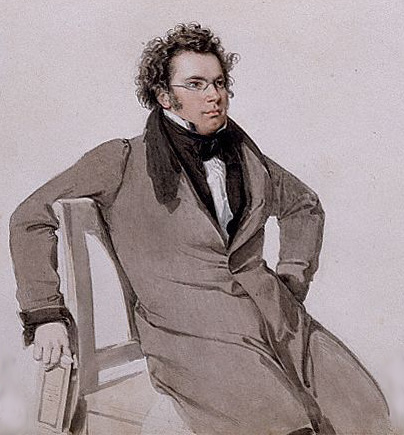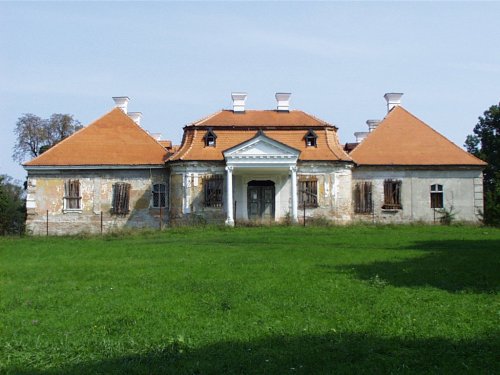More on Schubert (my other musical passion):
 Franz Schubert (1797-1828)
Franz Schubert (1797-1828) Countess Karoline Esterhazy (1805-1851)…this portrait from a lost watercolor by Josef Teltscher, 1828.
Countess Karoline Esterhazy (1805-1851)…this portrait from a lost watercolor by Josef Teltscher, 1828.I often wonder about the mysterious Countess Karoline Esterhazy. My interest had become an obsession, but sadly, information about her is rather hard to come by. I would love to know more about her broken marriage, or why she died at age 46 in 1851, but here I shall remember her and her friendship with composer Franz Schubert.
Her father was Johann Karl Esterhazy of Galanta, and in the summers of 1818 and 1824 Karoline and her older sister Marie were pupils of Schubert. Schubert’s late works (at least from 1824 on) seem to evoke her presence very strongly; however, her presence in Schubert’s personal life is largely shrouded in mystery, of which we know only a few concrete details.
During the summers of 1818 and 1824 Schubert took the two-day journey on stage-coach from Vienna to the Esterhazy summer residence, located in Zseliz, now Zeliezovce in Slovakia (more than a hundred miles from Schubert's home city of Vienna). Biographer Brian Newbould describes Zseliz as a "small market town".
Before leaving Vienna to go to Zseliz (in 1824), Franz Schubert wrote in a letter to a friend:
I feel myself to be the most unhappy and wretched creature in the world. Imagine a man whose health will never be right again, and who in sheer despair over this ever makes things worse and worse, instead of better; imagine a man, I say, whose brilliant hopes have perished, to whom the felicity of love and friendship have nothing to offer but pain, at best, whom enthusiasm (at least of the stimulating kind) for all things beautiful threatens to forsake, and I ask you, is he not a miserable, unhappy being? ‘My peace is gone, my heart is sore, I shall find it never and nevermore,’ I may well sing every day now, for each night, on retiring to bed, I hope I may not wake again, and each morning but recalls yesterday’s grief. Schubert was really sick with syphilis by 1824. Since the beginning of the year his doctor had him confined to his lodgings and on a special diet. By the end of March Schubert was showing the signs of the 2nd stage of syphilis, the lesions to the mouth and throat that affected his voice.
By May, it appears Schubert’s symptoms had abated, and he was able to fulfill his tutoring duties in Zseliz. He must have really had to suppress his emotional and physical ordeal to function in the Esterhazy castle.
Incidentally, I found a picture of the one-story Esterhazy Castle after a long search on the internet. It is interesting to see how it looks in this photo, with the windows boarded up (it has recently been restored):

This photo is fascinating to me…inside this summer residence Schubert tutored Count Esterhazy's daughters in piano and singing, and by 1824 Schubert had found himself 'in love' with the 18 year old Karoline. According to Eduard Bauernfeld, Schubert was "head over heals in love with one of his pupils, a young Countess Esterhazy, to whom he also dedicated one of his most beautiful piano pieces, the Fantasy in F Minor for piano duet".
This is true; Schubert did dedicate this work, one of his most important works for piano, to Karoline in 1828. Brian Newbould says that Bauernfeld is not always a reliable witness, but generally he has been a great help to scholars (such as mentioning the existence of the unfinished 10th Symphony and etc) and believes that Bauernfeld was problably correct over Schubert's infatuation with the Countess. Schubert once refers to her in one of his letters as "a certain attractive star" and another friend of Schubert, named Schonstein writes:
This flame [for Karoline] continued to burn until his death. Karoline had the greatest regard for him and for his talent but she did not return this love; perhaps she had no idea of the degree to which it existed. I say the degree, for that he loved her must surely have been clear to her from a remark of Schubert's--his only declaration in words. Once, namely, when she reproached Schubert in fun for having dedicated no composition to her, he replied, "What is the point? Everything is dedicated to you anyway." Brian Newbould continues:
Whether, at this juncture in his life, Schubert’s new feelings for Karoline brought him more joy than sadness is a matter of speculation. It was recognized by those aware of them that the difference in social standing between the two people would have made it virtually impossible for any amatory relationship to develop, even if Karoline’s own feelings were not as neutral as [Karl von] Schonstein maintains. In his diseased state, if she had been aware of his inclination and responded, he would anyway have found a deep irony in the possibility of a fulfilled and enduring partnership opening up after he had robbed himself of the capacity to pursue such an option. Daily contact with Karoline, then, would have stirred ambivalent emotions. Karl von Schonstein, who was there that summer, states that Schubert, the Countesses, and the Count spent the summer playing through Haydn’s
Creation and
The Seasons, as well as Mozart’s Requiem Mass. Since Karoline’s voice was ‘charming but weak’, she usually was the accompanist during these happy hours of music making.
Schonstein continues:
One morning in September 1824…Countess Esterhazy invited Meister Schubert during breakfast, which we all took together, to set to music for our four voices a poem which she was particularly fond; it was…Gebet [a poem by Friedrich de la Motte Fouque]. Schubert read it, smiled inwardly, as he usually did when something appealed to him, took the book and retired forthwith, in order to compose.As Newbould observes, “one can understand Schubert being stirred, in his present situation, by verses like this”:
Whatever you plan for me,
Lord, I stand ready.
Whether for the gift of devoted love
Or for Valiant battle. Maynard Solomon disagrees Karoline was a love interest; he feels the available evidence is not substantial enough for this claim:
It is difficult to give credence to this timeworn tale of a poor musician’s unrequited love for a highborn countess—recounted, not without some hints of irony, by Schober, Spaun, Bauernfeld, and Karl Schoenstein—for it is unsupported by contemporary letters or documents, and it doesn’t quite square with Schubert’s letters from Zseliz. “I sit here alone…,” he wrote in a letter of 1824, “without a single person in the world.” That is not very surprising, for the countess was somewhat retarded—her mother sent her to play hoops when she was thirty, and though she married as she neared forty, an annulment followed shortly thereafter.The claim that Karoline was mentally handicapped comes from Otto Erich Deutsch, who wrote in his
Schubert: A Documentary Biography that:
[Karoline] remained so much a child that her mother sent her out to play hoop when she was thirty. Rita Steblin refutes Maynard Solomon, by noting that Deutsch didn’t provide any documentation for this claim. She also reveals a previously unpublished reference regarding Schubert and Karoline, from Bauernfeld’s diary written in the month of Febuary, 1828, when Schubert was still alive:
Schubert appears seriously in love with the Countess E. This pleases me about him. He’s giving her lessons.Schubert also began to write many duets for the piano. The Sonata in C Major for piano duet, also known as the
Grand Duo, is the longest of the duets Schubert wrote that summer. Schumann was the first (of many writers) to believe this sonata was a symphony is disguise.
Brian Newbould writes:
It is as true to speak of Schubert’s vision in this work as ‘symphonic’ as it is in the case of the G Major String Quartet, the String Quintet in C, or the Piano Sonata in B Flat. It does not mean that any of these works was conceived for orchestra; it does mean that the composer seeks to capture the symphony’s wealth of incident, range in color and depth of argument, but within the specifically chosen instrumental framework. Schubert’s works for piano are unique even compared to Beethoven, who music in general is more dramatic compared to Schubert's lyricsim. These sonatas are vast epics played out on the subjective, intimate wilderness of private moments and memories. The
Grand Duo and the mature piano sonatas may be large in scale, but even more important is their intimacy, or the idea that they belong in the home rather than the concert hall. The smaller piano works have this quality too of course, like the Fantasia in F Minor mentioned already. The sentiments expressed in the music is rather private in nature...the dynamics become mostly pianissimo throughout (although not always). The long stretches of lyrical pastoral movement evokes much nostaligia (happy and sad) for the intimate, private moments we have all shared in with loved ones or nature and etc.
The fact Schubert wrote duets at the Esterhazy castle suggests he was to play duets with Karoline and Marie, or have them play together. Perhaps the memory of these music lessons with Karoline fueled the
Fantasia in F Minor for piano duet, written later in 1828 and dedicated to her.
Brian Newbould comments:
That so personal and masterly example of his mature art should be dedicated to Karoline Esterhazy testifies to the warmth of his regard for her. Although in one sense she was a ‘distant beloved’—because of the social divide that separated them—she lived in the same city and the fact that there is no documentary record of their meeting in the last three years of Schubert’s life does not necessarily mean that the flames of his ‘idealized love’ were not fanned by her presence at all during that time.